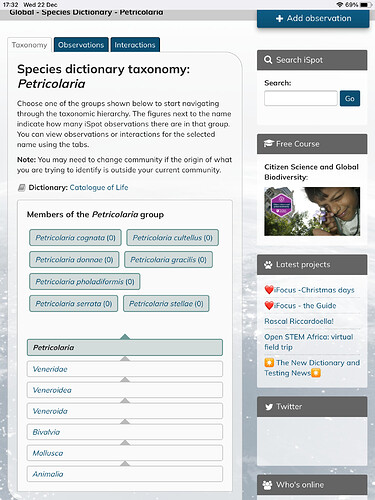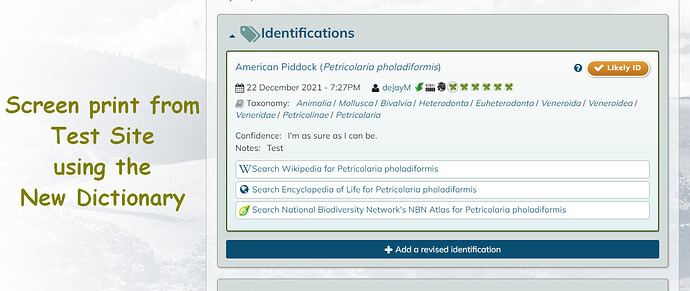Looking at https://www.ispotnature.org/communities/uk-and-ireland/view/observation/833471/propylea-14-punctata-bioblitz-s295-2021 I was surprised to find that there were no other observations of this species cited. Were all the previous observations under earlier names (Calvia 14-punctata / Calvia quattuordecimpunctata / Coccinella 14-punctata / Coccinella quatuordecempunctata)?
It would be a shame if updating the name lost the links to earlier observations.
Doesn’t this page list all observations of that species?
Or am I not understanding the question?
i am VERY sympathetic to that cause
The name Coccinella quatuordecempunctata is in the new (Proposed) dictionary as Propylea quattuordecimpunctata. Species Dictionary | Natural History Museum
But even if it changes again, the lovely Common name holds all scientific names, new and old, together…**
We must not lose the common common-names, the historically accepted ones. But equally we should not have an abundant series of alternative common, or regional. names in the Drop-down.
The Common name menu in iSpot, however, is causing relatively serious problems in iSpot. A good number of Fungi, we discovered in the recent iBlitz, have broken up Other Observations because a common name MAY be linked to the wrong Scientific one. And so we may get two sets of different Other Observations.
Sorry Chris you came as I was editing…
The other part to the question is VERY valid - what happens to old Names with the Likely banner WHEN the new Dictionary is installed (with new names)? It’s going to take some pretty advance coding to sweep the site and change old for new.
Already we see that IF new names are used in the Current site (I can give and show examples), then they are Validated but they do not always get awarded the Likely Banner.
**I notice (just tried) that 14-Spot does not get a response in the Common name menu and yet IS the common name with the ID. So there is a LOT of work to be done on Common names in Menus.
Aha! I look at the original page again and, lo and behold, the previous observations are listed. Was I blind before or … ?
Sometimes they take a while to load.
Do remember only 49 are collected in Other Obs. (and in Chris’s Link above - one page) whereas, using the Explore Community Filter, all 387 observations can be viewed.
.
I don’t think there are observations under these names.
(Calvia 14-punctata / Calvia quattuordecimpunctata / Coccinella 14-punctata / Coccinella quatuordecempunctata)? Or I can’t find them…
Here’s the Browser https://www.ispotnature.org/communities/uk-and-ireland/species-dictionary/NHMSYS0020151767/coccinellidae
Every day I learn something new about ispot.Today it is that 49 is the limit for Other Obs; I guess that red seaweeds posts are not as popular as 14-spot ladybirds, so it never came to my attention.
.
I have just taken from my bookshelf a booklet, 1986 Ladybirds of Dorset, Adrian Moon, where Propylea 14-punctata keys out and is illustrated.
.
It says there are 34 ladybirds species recorded for Dorset and has a section on Ladybird Folklore including "In Dorset the number of spots foretold the price of wheat, each spot representing a shilling per bushel (for younger ispoters these were the units we used in days of yore). They also warn of danger as in "Leady-bird, leady-bird! vlee away hwome; your house is a-vire, your children wull burn. Dorest 19th Century.
.
So thank you all for this post which I have enjoyed.
I was surprised to find the American Piddock, Petricolaria pholadiformis, which was in my Tebble’s 1966 book of British Bivalve Shells, published by British Museum, wasn’t in the ispot uk species directory
https://www.ispotnature.org/communities/uk-and-ireland/species-dictionary/NBNSYS0000178607/veneridae
It is in the current NHM directory
https://www.nhm.ac.uk/our-science/data/uk-species/taxon?tvk=NHMSYS0021006626
apparently entered in 2014,so it seems odd if it wasnt in the previous directory
I found this ispot page. https://www.ispotnature.org/communities/global/species-dictionary/13219275/petricolaria
And trying a screen shot…
Which does list P. pholadiformis but has no ispot posts.
I’m in global community, if that is relevant.
first things first. Chris’s note relates to the UKSI (2007) UK Community Dictionary
Whereas JoCs relates to the CoL 2008 the Global Community Index.
There are pretty frustrating anomalies in both - plenty of examples of synonyms in use and plenty of absences and some outright mistakes.
P. pholadiformis is, in some ways, a typical example of Dictionary issues where alien species, whether we consider them common or not, are not entered in dictionaries. The New Dictionary, when installed, will immediately be out of date. The latest addition to the UKSI (NHM) was three days ago.
Here is the Observation in question
https://www.ispotnature.org/communities/uk-and-ireland/view/observation/836361/ but it is one of many similar cases. Testers are having fun with dozens of them.
I can take the ID to the Test Site and see what happens - all WILL be well in this case but not, yet, plenty of others
To be fair, the New Dictionary is a wonder - it WILL be lovely to use but will still have issues and difficulties. It needs more testing before installing and the Curator needs more input from interested parties.
We need more use of the tags absent1 and taxonomy1 see Taxonomy issues PLEASE (now 2 years old)
There is a dedicated Forum thread here Proposed-dictionary testing where both the Curator and Coder respond; and a Project here https://www.ispotnature.org/communities/uk-and-ireland/view/project/835018/-the-new-dictionary-and-testing-news
Thanks for the answers. I now realise it is/was in the old uk dictionary, not in the family veneridae but in family Petricolidae (now subfamily Petricolinae) as
Petricola etc
But I’ve now found that My Banded Venus https://www.ispotnature.org/communities/uk-and-ireland/view/observation/138755/bandedvenus767 ,& that of 4 others, isn’t in the ispot dictionary which says zero species
https://www.ispotnature.org/communities/global/species-dictionary/12946561/clausinella-fasciata/observations
Your second link goes to the Global Community - there really are no Obs of Banded Venus in the Global Community
True though that sometimes the Browser does lie (commonly does)
In this case however it seems fine https://www.ispotnature.org/communities/uk-and-ireland/species-dictionary/NBNSYS0000180557/clausinella They are lovely Observations that deserve far more support
(My comment above came after doing a search for a case where the species &or genus had changed name but the old likely’s remained but with new name in other observations & Wikipedia etc. But not long after,realising I’d fallen down the global dictionary rabbit-hole, deleted it & got the message that it’d be removed in 24 hours (so am a bit surprised it’s still there)
You deleted your second comment (only), not the first. The first was present yesterday but so was the message about you having removed (the other one) That’s fine then - sorted.
There is a LOT of confusion and difficulty about Communities. Look in Global, get trapped in Global, open a za Observation and your Community is immediately za…
Even the word Global is confusing - I have raised it all a few times with Admin
Perhaps slightly off-topic, for which I apologise, but having had another one come to my trap last night I looked back at Ashy Button (Acleris sparsana) | Observation | UK and Ireland | iSpot Nature. Hovering over the icon to the right of the name I found
No doubt something to do with the dictionary update but there doesn’t seem to have been a change here. Can anyone explain, please?
(I note that the this observation has found its way into the NBN atlas with the recorder’s name as “Thistle”. While that is understandable, I’m mildly surprised that when records were transferred from iSpot they didn’t use my real name in place of my nom-de-plume. Perhaps something to do with the dreaded data protection regulations? I wonder if I should ask for my screen name to be changed to Ian Malcolm?)
I am not sure what has happened about the name, there is a chance it might be slight alteration in formatting or spaces, but basically I don’t know and ChrisV is no longer officially here to ask.
On the recorders name front then we do just use the name from iSpot as the assumption is that this is what everyone wants to use and it would be very difficult to change this when passing on data. I can change your name on ispot to your real name if you want then that would be passed on with the next update to NBN. As far as I understand they just overwrite data so all the thistle records would be changed to ones by Ian Malcolm. I don’t know when the next lot of data will be sent to NBN, it may be a while as we are still struggling with non UK data to GBIF at present.
Mike, many thanks for your quick response. Some things seem destined to remain as (fairly irrelevant) mysteries!
Re the name, as some of my records appear on NBN by other routes under my real name, it would seem sensible to change my iSpot name: I’d be grateful if you could implement this as and when convenient.
Have changed your username on the main site, not sure if it will be propagated over to the forum. Not sure I have changed a username before for someone with so many interactions so will be interesting to see how this goes.
Seems good on the main site: many thanks. Previous forum posts don’t seem to have changed: see above. I wonder who’ll show up as the author of this post?
Ian/Thistle



